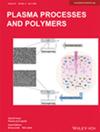研究冷大气等离子体对皮下深部肿瘤细胞的抗癌作用
IF 2.9
3区 物理与天体物理
Q2 PHYSICS, APPLIED
引用次数: 0
摘要
冷大气等离子体(CAP)疗法已被证实能有效抑制皮下肿瘤的生长。然而,目前还没有研究解释等离子体诱导的抗癌效应如何通过正常细胞传递给癌细胞。在此,我们从细胞活力和细胞内活性氧水平方面监测了经血浆照射的 HaCaT 细胞对未经照射的 A375 和 HaCaT 细胞的影响。实验结果表明,血浆辐照可诱导经血浆辐照的 HaCaT 细胞向细胞培养液中释放可溶性因子,从而选择性地杀死未受辐照的 A375 细胞。等离子体产生的短寿命物质在可溶性因子的释放过程中起着至关重要的作用。我们的研究表明,血浆诱导的抗癌效应可通过血浆辐照正常细胞传递到深部未辐照的癌细胞。本文章由计算机程序翻译,如有差异,请以英文原文为准。
Study on the anticancer effects of cold atmospheric plasma on deep subcutaneous tumor cells
Cold atmospheric plasma (CAP) therapy has been proven to effectively inhibit the growth of subcutaneous tumors. However, there is no research to explain how plasma‐induced anticancer effects can be transmitted to cancer cells through normal cells. Here, we monitored the effects of plasma‐irradiated HaCaT cells on nonirradiated A375 and HaCaT cells in terms of cell viability and intracellular reactive oxygen species levels in vitro. The experimental results indicated that plasma irradiation may induce plasma‐irradiated HaCaT cells to release soluble factors into the cell culture medium, thereby selectively killing nonirradiated A375 cells. The plasma‐generated short‐lived species play a crucial role in the release of soluble factors. Our research showed that plasma‐induced anticancer effects can be transmitted to deep nonirradiated cancer cells through plasma‐irradiated normal cells.
求助全文
通过发布文献求助,成功后即可免费获取论文全文。
去求助
来源期刊

Plasma Processes and Polymers
物理-高分子科学
CiteScore
6.60
自引率
11.40%
发文量
150
审稿时长
3 months
期刊介绍:
Plasma Processes & Polymers focuses on the interdisciplinary field of low temperature plasma science, covering both experimental and theoretical aspects of fundamental and applied research in materials science, physics, chemistry and engineering in the area of plasma sources and plasma-based treatments.
 求助内容:
求助内容: 应助结果提醒方式:
应助结果提醒方式:


